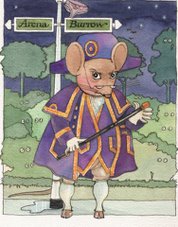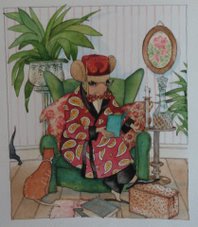
anticant’s father’s mother belonged to a very old family which had inhabited the Saddleworth district on the borders of Yorkshire and Lancashre for hundreds of years. Many legends about the family and its home, Woodbrow, were handed down the generations and it is only recently that anticant, as one of a group of family historians some of whom still live in the district, has made some progress in separating fact from fiction. Whether true or not, some of the old yarns are entertaining. What follows is adapted from an article written some years ago for the local historical society’s journal.
Soon after the end of Hitler's war I went with my aunt to visit Mrs Helen Banbery, whose father was the Saddleworth historian, Morgan Brierley of Denshaw House. Her mother, Susan Gartside, was my grandmother's third cousin. Mrs Banbery was by then a very old lady; she had published a memoir of her father (who died in 1897) at the turn of the century, and she was now engrossed in making notes for a mammoth Gartside family novel. "They were a tragic and romantic family", she told us, "and I am making them even more tragic and romantic!" Sadly, she died soon afterwards, and I never knew what became of her novel: I would have loved to have read it.
There is certainly plenty of romance (and romancing) around Gartside family history and, as with most family histories that are handed down the generations, it becomes increasingly difficult as time goes on to separate hard facts from romantic traditions.
The family home, Woodbrow, was built around 1812 by my grandmother's grandfather, Captain Thomas Gartside of the Royal Lancashire Militia (and later of the 11th Light Dragoons, which became the 11th Hussars), possibly after he had retired from active service on half-pay in 1811. Captain Gartside was born in 1777 and died in 1859. His father, Abraham Gartside, a tanner, of Stalybridge, was born in about 1707 in the reign of Queen Anne, but did not marry until 1772 aand died before Thomas, his youngest child, was born. In 1803, Captain Gartside married Mary Anna Reed, the daughter of a wealthy Tynemouth, Northumberland, shipowner.
There are several family legends about Captain Gartside which do not always square with facts gleaned from prosaic sources such as parish registers and army records. Although older generations of the family told me that he served with his regiment in the Peninsular Wars, and was present at the battle of Waterloo, it is evident from the record of his army service that he cannot have done so. From 1806 he was an officer in the 11th Light Dragoons, who were stationed in Ireland and only went out to Spain in 1810, in which year Captain Gartside transferred to the 67th (South Hampshire) Regiment of Foot. In 1811 he went onto the half-pay list on grounds of ill-health, and from then until his retirement in 1834 he was in the 5th Garrison Battalion. So the actual origins of the family cannon ball – whereabouts now unknown - which he was said to have brought back from the battlefield of Waterloo are obscure!
The second mystery is precisely when and for what reason the "Barracks Cottages" below Woodbrow were built, and how long they were used for soldiers' quarters. The family tradition is that they were required because of the industrial unrest and Luddite outrages during the bleak later years of the Napoleonic Wars; and there is a splendid story of Captain Gartside intrepidly marching his mutinous troops (who sympathised with the rioters) home across the moors from Huddersfield at pistol-point. He was certainly a robust character, and is said to have treated his workpeople harshly. There are also unconfirmed rumours that some of his wealth may have come from association with the slave trade.
Then there is the business of the unburied daughter in the glass coffin. Captain Gartside's second daughter, Josephine, died aged twelve in mid-October 1820, but was not buried until early December. The family legend is that her father was so heartbroken at her death that he had her body embalmed and kept in the house in a glass-lidded coffin until the sanitary authorities forced him to bury her. In fact, it was a double funeral at Heights, as Josephine's baby brother, John Reed, who had died in late October aged one week, was also buried with her. Whatever the reason, a delay of seven weeks in one case and five in the other does seem very unusual. What is certain is that when my grandmother was a little girl, over half a century later, there were still several white busts of Josephine which had been modelled from her death mask and were kept in the cupboard under the stairs at Woodbrow. My grandmother told me that she and her brothers and sisters used to run quickly past this cupboard, as they were scared of these spooky objects. There were, of course, ghosts as well – one a grey cat which was said to appear in the house before a family death.
Captain Gartside built up a business as a woollen weaver and printer at Woodbrow, with his second and third sons, Thomas (1812-1894) and Horatio Nelson (1828-1888), who was my great-grandfather. The eldest son, William Reed Gartside (born c.1806), was disinherited – possibly because of his unorthodox love life: he had several “natural” children before marrying - although he lived nearby at Boosted Edge Farm. Captain Gartside's second daughter, Mary (or Marianne), also got into the parental bad books for several years because she eloped with an actor, "Handsome Jack" Neville who was manager of Queen's Theatre, Spring Gardens, Manchester. He was more than twenty years her senior, and when he married her he already had eighteen children by his first wife, himself being a twentieth child - so no wonder Captain and Mrs Gartside thought the match unsuitable!
Mr and Mrs Neville had a daughter and two sons, one of whom, Thomas Henry Gartside Neville (1837-1910), was first carried on stage by his father at the age of three, and became a prominent West End actor/manager in the later Victorian and Edwardian era of romantic melodrama under his stage name of Henry Neville. His most celebrated role was that of Bob Brierley in Tom Taylor's "The Ticket of Leave Man" - a part which the Dictionary of National Biography says he played some 2,000 times! Henry Neville founded a family which still flourishes, and whose members have intermarried more than once with later generations of Gartsides.
Captain Gartside's descendants lived and worked at Woodbrow throughout most of its existence. My grandmother, Sarah Holden Gartside (1873-1947), who was the tenth child and fourth daughter of H.N. Gartside, was born and grew up there. My great-grandfather was only sixty when he died of cancer in 1888. Tragically, his widow and her eldest surviving son, Charles - a highly thought of solicitor who was England's youngest Town Clerk (of Ashton-under-Lyne) - died on the same day in October 1899, so there was another sad family double funeral at Heights. Another of my great-uncles, Arthur Gartside, who died in 1932, lived in part of the house for many years. Around 1900, the factory (now demolished) alongside the house at Woodbrow was leased to a son-in-law of William Reed Gartside), who with his son carried on the traditional cloth weaving and block printing business there into the twentieth century.
The house, with the farm and surrounding land, was sold by the family trust in 1950/51 for the princely sum of £3,400 - "a most satisfactory result", we were assured at the time! Now divided into two halves, it is probably worth well over £1 million today. Oh, well, that's life.




